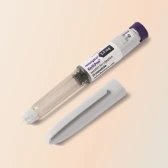Retatrutide is a new triple-agonist weight-loss injection in development by Eli Lilly. The first phase 3 trial shows it leads to an average weight loss of 28.7% at 68 weeks—the highest seen so far among obesity treatments.
With the first phase 3 trial now complete and seven more expected in 2026, UK approval could come in late 2026 or 2027 pending full MHRA review. Below, we explain how it works, what the trials show, potential side effects, and when it could be available in the UK.
Key Takeaways
- Mechanism of action: Triple-hormone agonist targeting GLP-1, GIP, and glucagon receptors
- Efficacy: 24.2% average weight loss in 48 weeks
- UK availability: 2026 (UK), potentially 2027 (FDA)
- Common side effects: Nausea, diarrhoea, vomiting, constipation
- Safety profile: Similar to existing GLP-1 medications but with concerns about rapid weight loss

What is retatrutide?
Retatrutide is a once-weekly weight loss injection that targets three hormones: GLP-1, GIP, and glucagon.
According to Eli Lilly clinical data, this “triple G” mechanism sets retatrutide apart from Wegovy, which targets one hormone, and Mounjaro, which targets two. Retatrutide is the first triple-agonist therapy in development for obesity, combining the actions of three key metabolic hormones.
This “triple G” effect is what makes retatrutide one of the most advanced treatments in development. In clinical trials, it led to greater weight loss than any currently available medication
How does retatrutide work?
Retatrutide helps with weight loss by mimicking hormones that reduce hunger, slow digestion, and increase energy use.
- GLP-1 stimulates the release of insulin, slows your digestion, and helps suppress your appetite.
- GIP enhances insulin release and may work to prevent fat buildup.
- GCG, a.k.a glucagon, may increase the amount of energy your body uses while helping to burn fat.
This triple mechanism helps reduce hunger, improve insulin sensitivity, and may increase the number of calories your body burns, all of which support sustained and meaningful weight loss.
Retatrutide clinical trials: How effective is it for weight loss?
Retatrutide is currently being investigated in multiple late-stage (phase 3) clinical trials for obesity, with the first successful trial (TRIUMPH-4) completing in December 2025. Seven additional phase 3 trials are expected to complete in 2026.
The TRIUMPH-4 trial studied people with obesity and knee osteoarthritis. On the highest dose (12 mg), participants lost an average of 28.7% of their starting weight at 68 weeks. Nearly 60% of people achieved at least 25% weight loss, and around 40% lost 30% or more of their body weight.
For comparison at 68 weeks:
- Mounjaro: approximately 22% mean weight loss
- Wegovy (2.4 mg): approximately 17% mean weight loss
- Wegovy (7.2 mg): approximately 20% mean weight loss
Bottom Line: Retatrutide currently shows the most significant weight loss potential of any GLP-1-based drug studied to date.
When will retatrutide be available in the UK?
Retatrutide is not yet approved in the UK. The first phase 3 trial completed successfully in December 2025, with seven additional phase 3 trials expected to complete in 2026. The MHRA will review safety and efficacy data once all trials conclude, followed by NICE evaluation. Approval could come in late 2026 or 2027.
Retatrutide vs other weight loss medications
Here’s a table summarising the key differences between retatrutide and the main weight loss medications on the market, a.k.a Wegovy and Mounjaro. If you’re curious to see how they stack up side by side in more depth, check out our separate article comparing retatrutide, Wegovy and Mounjaro.
Comparing retatrutide, Mounjaro, and Wegovy
Compared with Wegovy and Mounjaro, retatrutide acts on more hormones and has shown greater average weight loss—28.7% at 68 weeks in the first phase 3 trial.
You can also see how retatrutide compares with mazdutide, another new weight-loss injection in development, in our guide on mazdutide vs retatrutide.
What is retatrutide used for?
Retatrutide is being developed primarily for obesity treatment, but early research suggests benefits for type 2 diabetes and other metabolic conditions.
What are the potential side effects of retatrutide?
Retatrutide side-effects are similar to those seen with Wegovy and Mounjaro. In clinical trials, the most common side effects of Retatrutide were mild digestive symptoms like nausea, diarrhoea, vomiting, and constipation.These were dose-related, generally mild to moderate, and tolerability improved with slower titration.
A small, dose-dependent rise in resting heart rate was also observed, peaking around week 24 and easing thereafter. The increases were similar to those reported with other GLP-1 receptor agonists and are not considered a safety concern.
Altered or enhanced skin sensations (such as tingling or prickling) were also reported. These were mild to moderate and did not lead to treatment discontinuation.
The frequency of these side effects was higher in the 8 mg and 12 mg dose groups than at lower doses, and higher among participants who started on a 4 mg initial dose compared with 2 mg.
Bottom line: Early data suggest the safety profile of Retatrutide is comparable to existing GLP-1 medicines, with digestive symptoms most common and generally manageable through gradual dose increases.
Who can use retatrutide?
Once approved for use in the UK, Retatrutide will likely follow similar eligibility criteria to other GLP-1 weight-loss medications. Typically, this means adults with:
- A BMI of 30 or higher (obesity)
- A BMI of 27 or higher with weight-related health conditions (like type 2 diabetes, high blood pressure, or sleep apnea)
But not everyone will be suitable. Based on similar medications, retatrutide probably won't be recommended for:
- People with a personal or family history of medullary thyroid cancer
- Those with multiple endocrine neoplasia syndrome type 2
- Anyone with a history of pancreatitis
- Pregnant or breastfeeding women
- Children and adolescents (under 18)
- People with severe kidney or liver disease
Now, what about people without diabetes who want to lose weight? Good news— retatrutide trials include plenty of participants without diabetes. The medication appears safe and effective for weight loss regardless of diabetes status.
For those interested in metabolic health improvements or reducing liver fat without meeting obesity criteria, this gets trickier.
While early data suggests retatrutide might help with fatty liver disease and metabolic markers, it's primarily being developed for people with obesity. Using it for other purposes would likely be off label, requiring careful discussion with a specialist. However, often weight loss can improve health conditions such as fatty liver disease or high cholesterol.
Your weight loss journey
Retatrutide isn’t available just yet, but there are plenty of other weight loss medications out there that work brilliantly for those they’re suitable for.
As part of our science-backed weight loss programme, you can get Mounjaro or Wegovy weight loss injections, or orlistat weight loss capsules, posted to you each month. Plus personalised support from our team of coaches.
Our Voy weight loss results truly speak for themselves. Most people lose 10-15% of their starting weight and 97% say they feel more confident.
Take our quiz to see if you’re eligible. It won’t take more than a few minutes.














